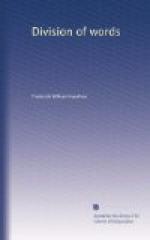Division is greatly affected by the length of the measure. A long measure, 18 or 20 ems or more, gives greater opportunity for arranging the spacing, but, on the other hand, makes division on short syllables conspicuous and out of proportion. Very short register, as in two-column Bibles or in cases where illustrations are inserted in the text, presents very great difficulties and often calls for division which would not be allowable elsewhere. Such cases often call for the exercise of the greatest care and ingenuity.
It often happens that the author can be of great assistance to the printer in making a handsome page. A change of a phrase, or even of a word will avoid a difficulty which cannot be avoided by a printer except at the cost of bad division or bad spacing. If the author is a sensible person he will gladly cooperate with the printer in giving his thoughts clothing appropriate to their intrinsic beauty and value. After the printer has exhausted his resources he should not hesitate to carry his troubles to the author.
DIVISION IN LINES OF DISPLAY
As a rule division is never used in lines of display. In these cases the display is the important thing. Every word long enough to be divided is important enough to be displayed and emphasized. Divided words are weakened words. Lines of irregular lengths are used of set purpose.
In title pages words of bold display must never be divided. In minor lines of display, such as subtitles and summaries, words are often divided. A subheading of two lines should never be divided in the first line when it is possible to turn the full word over on to the next line. The shortening of the first line is never a blemish, but a too short second line following a hyphened first line is always a fault.
There is a school of ultra-artistic composition in book titles which affects a solid squaring up and hesitates at no means to secure its effects. It sets a definite measure and forces the lines into it, dividing words arbitrarily and using no hyphen. This is a passing fancy and will pass as eccentricities always pass. It should not be used unless the author insists upon it. The man who pays the bills has a right to have his work done as he pleases. The intelligent printer, however, will not allow the peculiarities of the individual customer to affect his general practice.
Note
The pupil is referred to the appendix to DeVinne’s “Correct Composition” for rules for the division of French, German, and Spanish words. The same appendix contains also a very excellent list of words which are spelled differently by different authorities, together with divisions for them.
SUPPLEMENTARY READING
Correct Composition. By Theodore L. DeVinne. Oswald Publishing Co., New York.
The Writer’s Desk Book. By William Dana
Orcutt. Frederick A. Stokes Co.,
New York.




